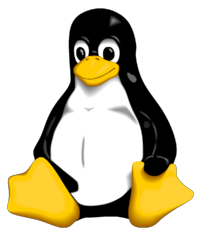Tux/Citable Version
Tux the penguin is the official logo, and cartoon mascot, for the Linux computer operating system. The character was first drawn in 1996 by Larry Ewing.
Origin and development
Tux originated as the result of a discussion on the Usenet "Linux kernel" mailing list. On May 1, 1996, Matt Hartley began a thread titled "Linux logo", which included an image by David Christiansen showing the planet Earth as seen from outer space, along with the captions "LINUX" and "Take your computer to another dimension."[1][2] The next day Alan Cox posted a message suggesting that the Linux logo should be "a picture of the BSD daemon" — the logo for another open source operating system — "flat out on the floor with stars around its head and a penguin in boxing gloves standing on top."[3] In response, Mark Lehrer, posted that because Microsoft's Windows 95 — then the dominant commercial PC operating system — instead of FreeBSD was Linux's real competition, the logo should instead show a penguin smashing a window.[4] Alan Clucas replied that these two ideas should be combined, with a Linux logo victorious over both its counterparts.[5]
At this point Linus Torvalds, the software engineer who had initiated the development of Linux, unhappy with the idea of officially endorsing the mocking of other operating systems, posted his favorite penguin image, and requested that someone with artistic skills design a logo using a similar image under an appropriate license, while emphatically stating that this concept was final.[6] (The model image referred to by Torvalds is still available as of April 13th, 2007 from its original location on the University of Helsinki's FTP server. [1])
Dale Scheetz posted a prototype drawing, which showed a penguin holding up the Earth.[7] Torvalds replied that the penguin did not appear strong enough to hoist an entire planet, and in fact looked like it was in imminent danger of being squashed. He went on to describe the penguin that he envisioned — a cute, cuddly animal, sitting after eating a grand feast of herring, content and smiling after a small burp. The penguin was not to be fat, but instead gorged with fish.[8] Torvalds later noted that he was not looking for a "Linux Corporate Image", but for something fun that could be extensively modified but still recognizable. He has often expressed his affinity for penguins, once jokingly claiming that after being bitten by a ferocious penguin he developed a disease called "penguinitis", which "makes you stay awake at nights just thinking about penguins and feeling great love towards them". He claimed to have had a similar experience while visiting the Canberra zoo with Andrew Tridgell, where a small pigmy penguin nibbled on his finger.[9]
Larry Ewing drew the original version of Tux on his 486 DX2/50 computer running Linux, using version 0.54 of The GIMP graphics program. Because his monitor was an 8-bit display with limited graphics capabilities, the final smoothness was rendered using software on an SGI Crimson workstation. (A complete description of the methods Ewing used is on his website. [2])
The new mascot still needed a name. Humorously, one of the earliest suggestions, from Henning Schmiedehausen, was to call the penguin "Homer", because of its resemblance to the television character Homer Simpson.[10] As a joke, Tux was later re-drawn by Anton Johansson as an image of Homer morphed into a penguin. There were also some early references to the penguin as "Linnie". However, "Tux", coined by James Hughes, soon caught on. This name had a two-fold meaning, both as an acronym for Torvalds Unix, and as a pun based on the shortening of tuxedo, which penguins are often said to be wearing.[11][12]
Like Linux itself, Tux has never been static. From the beginning, people have decided to "play with" and re-draw him in "goofy" ways. Among his creative castings, Tux has been a skateboarder, a ninja, and a pipe-smoker. He has appeared in magazines, television broadcasts, video games and other software, and on mouse-pads. His persona has been emblemed onto clothing, stickers, and other paraphernalia. Sculptor Eric Harshbarger made a 25" Lego model of Tux,[13] and anyone can make a plush toy out of him (see photo at right) from freely available cut-out patterns.[14]
Tux may even have competing romantic involvements, Gown and Penny, two female penguins who have appeared in several open source games. Tux's status remains unclear, however, since the gals are not official Linux projects.
Why a Linux mascot?
Exactly why the early players in Linux's development felt they needed a mascot for their budding operating system remains a mystery. Irrespective, their fish-gorged penguin has certainly captured imaginations, both inside and outside of the global community of Linux fans.
References
- ↑ Matt Hartley (1996-05-5). Linux logo.
- ↑ David Christiansen. lin64.jpg.
- ↑ Alan Cox (1996-05-2). Re: Linux logo (LKML).
- ↑ Mark Lehrer (1996-05-4). Re: Linux logo.
- ↑ Alan Clucas (1996-05-4). Re: Linux logo.
- ↑ Linus Torvalds (1996-05-5). Re: Linux logo thread on the Linux Kernel Mailing List (LKML).
- ↑ Dale Scheetz (1996-05-9). Linux Logo prototype..
- ↑ Linus Torvalds (1996-05-9). Re: Linux Logo prototype..
- ↑ Steve Baker. A Complete History of Tux.
- ↑ Henning Schmiedehausen (1996-06-10). Re: Let's name the penguin! (citation 1).
- ↑ James Hughes (1996-06-10). Re: Let's name the penguin! (citation 2).
- ↑ LD Landis (1996-06-12). Re: Let's name the penguin! (citation 3).
- ↑ Eric Harshbarger. Linux Penguin - LEGO.
- ↑ See http://www.free-penguin.org
Other software mascots
- The BSD Daemon, the mascot of the various Berkeley Software Distribution releases
- Wilber, the mascot of The GIMP
Subtopics
External links
- ccpenguin.jpg Torvalds' original penguin image. At his recommendation, Tux is based on this image
- Larry Ewing's description of how he drew Tux


